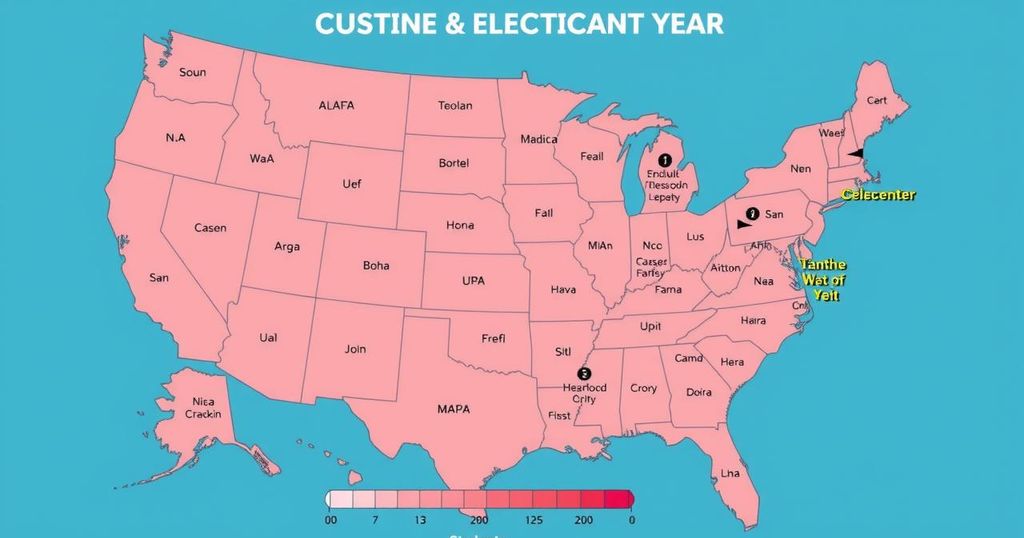2024: Defining a Super Year for Global Elections
The year 2024 was marked by a historic surge in democratic participation, with nearly 3 billion voters across 73 countries. While the elections showcased the power of voter mobilization, they also highlighted urgent challenges, including disillusionment, misinformation, and underrepresentation of women and youth. Notable shifts in political leadership were observed, particularly with the emergence of younger leaders in Africa, countering the rise of far-right movements. Overall, the elections reflected both progress and vulnerabilities within the democratic framework.
The year 2024 represented a significant chapter in the history of global democracy, witnessing an unparalleled engagement in electoral processes with nearly 3 billion individuals participating across 73 nations. This phenomenon, termed the “super election year,” highlighted the critical role of democratic participation in shaping political, social, and economic landscapes. However, the elections also brought to light major challenges such as voter disillusionment, trust deficits in institutions, and the proliferation of disinformation, which collectively pose threats to the integrity and effectiveness of democratic systems worldwide.
The dynamics of the 2024 elections revealed the complex state of global democracy, as numerous incumbents faced rejection from voters, perceived as out of sync with public concerns. In several countries, such as France and Germany, far-right movements capitalized on economic discontent and cultural tensions yet were hindered from attaining power by centrist coalitions. Despite instances of election irregularities, including vote-buying allegations in Serbia and voter suppression tactics in the United Kingdom, signs of resilience emerged. This included the rise of youthful leaders in several African nations indicative of a broader shift towards more inclusive governance, alongside efforts for cooperation across ideological lines.
Women’s political participation experienced both victories and setbacks in 2024. Notably, Mongolia advanced women’s representation in its legislature by introducing a gender quota, resulting in a seven-percentage point increase. Contrastingly, declines were seen in Bhutan and Belarus, demonstrating that progress in gender representation is inconsistent on a global scale. Concurrently, youth representation continued to lag, with leaders typically older than the electorate, despite some younger executives being elected, particularly in Africa.
The challenges highlighted during this electoral cycle include issues of electoral integrity, with various reports of fraud undermining public confidence, as well as concerns regarding the misuse of state resources by incumbents. Disinformation campaigns, intensified by social media and artificial intelligence, further exacerbated polarization and diminished trust among citizens. Against this backdrop, the significance of addressing women’s and youth representation in political systems remains a pressing issue, alongside broader socioeconomic discontent rooted in post-pandemic challenges and rising economic distress.
The far-right movements gained a foothold in numerous regions, demonstrating a complex interplay of democratic progress and setbacks, and emphasizing the need for steadfast commitment to democratic principles to counteract potential regression. However, 2024 offered momentum for political innovation and avenues for improving representation and civic engagement moving forward. Ultimately, this year served as both an obstacle course and a launchpad for strengthening democratic renewal and ensuring that governments respond adeptly to the evolving aspirations and challenges faced by their constituents.
The 2024 elections were heralded as a significant turning point in global democratic practices, where an unprecedented number of voters participated. The year was earmarked by the breadth of elections across diverse regions encompassing local and national scopes. However, the electoral environment was fraught with challenges, particularly concerning disillusionment among voters, erosion of trust in political institutions, and the pervasive impact of disinformation, all of which undermine the democratic process. This backdrop elucidates the need for a thorough understanding of the electoral landscape during this remarkable year.
In summary, the 2024 elections encapsulated both the potential of and the vulnerabilities inherent in current democratic systems. With nearly 3 billion citizens voting globally, the importance of participatory engagement became starkly evident. However, ongoing issues like electoral integrity, representation disparities, and the scourge of disinformation merit urgent attention. While the year presented significant challenges, it also unveiled opportunities for renewing commitment to democratic values, enhancing citizen representation, and fostering inclusive governance, essential as societies transition into an ever-evolving landscape.
Original Source: anfrel.org




Post Comment